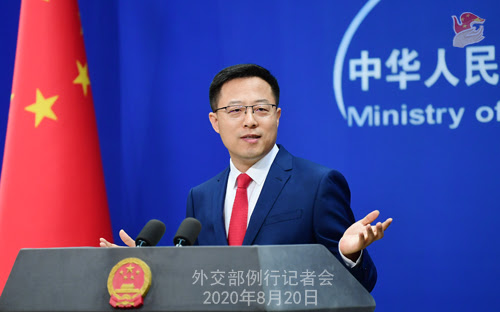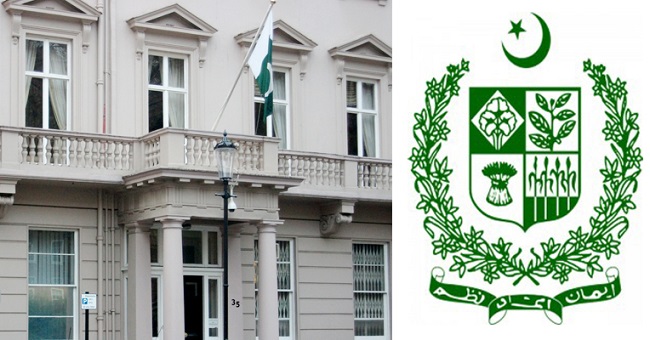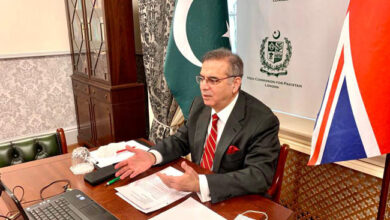China firmly opposes unilateral sanctions and “long-arm jurisdictions” imposed by the US against other countries

As agreed by China and Pakistan, State Councilor and Foreign Minister Wang Yi and Foreign Minister Shah Mahmood Qureshi will co-chair the second bilateral Foreign Ministers’ Strategic Dialogue in Hainan from August 20 to 21.
CCTV: US Department of State said in a statement on August 19 that they on the same day notified the Hong Kong authorities of their suspension or termination of three bilateral agreements. These agreements covered the surrender of fugitive offenders, the transfer of sentenced persons, and reciprocal tax exemptions on income derived from the international operation of ships. Do you have any comment?
Zhao Lijian: The Hong Kong SAR government issued a statement where it strongly rejects and condemns the US government’s unilateral decision to suspend or terminate the three bilateral agreements it signed with the Hong Kong SAR. In response to the US erroneous move, China has decided to suspend implementing the Agreement Between the Government of the United States of America and the Government of Hong Kong on Mutual Legal Assistance in Criminal Matters.
I want to stress again that Hong Kong affairs are China’s internal affairs and no external force has any right to interfere. China urges the US side to immediately rectify its wrong decision, stop having a hand in Hong Kong affairs and China’s other internal affairs, and refrain from moving further down the wrong path.
RIA Novosti: US Secretary of State Pompeo said yesterday that the US will sanction Russia and China if the two countries disregard the US demand of re-imposition of United Nations sanctions on Iran. What is China’s comment?
Zhao Lijian: As I repeatedly stated, as the US has withdrawn from the JCPOA, it has no right to ask the Security Council to launch the snap-back mechanism that allows the re-imposition of sanctions. This is a common position shared by most members of the Security Council and a wide consensus reached by the international community.
China firmly opposes unilateral sanctions and “long-arm jurisdictions” imposed by the US against other countries. We urge the US to earnestly observe Security Council resolutions, fulfill its international obligations, heed the concerns of the international community and respect other countries’ legal rights and interests.
Associated Press of Pakistan: Further to your announcement about the second China-Pakistan Foreign Ministers’ Strategic Dialogue which will bring Pakistani Foreign Minister Qureshi to China, could you share more information about it?
Zhao Lijian: I announced earlier that China and Pakistan will hold the second bilateral Foreign Ministers’ Strategic Dialogue. This dialogue is a mechanism established to coordinate exchange and cooperation in various sectors, put forward policy suggestions on bilateral relations and enhance communication and coordination in regional and international issues. On March 19 last year, the first dialogue was held in Beijing with positive consensus reached, contributing greatly to bilateral relations.
As the regional and international landscape is going through complex changes, in particular with the profound global impact of COVID-19, China and Pakistan, as all-weather strategic cooperative partners, need to further strengthen communication and cooperation to deal with external challenges, achieve greater development and bring more benefits to the people. This strategic dialogue is highly relevant and significant. The two sides will have in-depth exchange of views on anti-epidemic cooperation, bilateral relations and regional and international issues of common concern. China hopes and believes that the dialogue will further cement strategic mutual trust, promote practical cooperation in various sectors and lead to closer coordination on regional and international affairs.
Al Jazeera: According to reports, Israel and the US are concerned about the cooperation between China and Saudi Arabia on nuclear power, citing potential security issues. Can you tell us more about the cooperation between China and Saudi Arabia?
Zhao Lijian: Those concerns are completely unnecessary. China and Saudi Arabia enjoy a comprehensive strategic partnership. Recent years witnessed steady and sound development of our bilateral relations with fruitful cooperation outcomes in various fields. We also have normal bilateral cooperation in energy.
China has been working to promote the peaceful uses of nuclear energy in the world with a responsible attitude. We will continue our strict fulfillment of international obligations in non-proliferation, and pursue cooperation in peaceful uses of nuclear energy with other countries on the basis of mutual respect and shared benefit, so as to contribute to global sustainable development.
The Paper: On August 19, 2020, at the invitation of the Foreign Ministry, Zhong Nanshan, head of the high-level expert group of the National Health Commission and academician of the Chinese Academy of Engineering, held an online discussion with representatives of the diplomatic corps in China to share China’s experience in the prevention and control of COVID-19. Could you share more details?
Zhao Lijian: On August 19, invited by the Foreign Ministry, Zhong Nanshan, head of the high-level expert group of the National Health Commission and academician of the Chinese Academy of Engineering, held an online discussion with representatives of the diplomatic corps in China to share China’s experience in COVID-19 prevention and treatment. Representatives of 158 diplomatic missions in China attended the virtual conference, and Director-General of the MFA Protocol Department Hong Lei presided over the event.
By presenting practical cases and accurate data, Dr. Zhong Nanshan gave a detailed briefing on China’s experience in fighting COVID-19 and measures to further contain the epidemic, shared the effective practices of early detection, early isolation, early diagnosis and early treatment, as well as the approach of integrating traditional Chinese medicine and Western medicine in treatment. On the development of coronavirus vaccine, which is of great interest to the diplomatic missions, he noted that as President Xi Jinping pointed out at the virtual opening ceremony of the 73rd session of the World Health Assembly, COVID-19 vaccine development and deployment in China, when available, will be made a global public good, which will be China’s contribution to ensuring vaccine accessibility and affordability in developing countries. China stands ready to strengthen cooperation with other countries on vaccine research, development and production.
Members of the diplomatic corps expressed their appreciation to the Chinese side for holding the online discussion, saying that the experience of COVID-19 control and treatment shared by Dr. Zhong Nanshan is highly professional, scientific and practical, which gives them much to be learnt from in their own fight against COVID-19.
CNR: The Untold Story of the Meng Wanzhou Case, a CGTN exclusive, has caught wide attention for telling the reason behind Meng Wanzhou’s detention. It reports that in 2013, Meng Wanzhou met with HSBC’s senior management and made a PowerPoint presentation. The presentation was acquired by the HSBC and later became the “key evidence” in a U.S. case against her on fraud charges. However, HSBC said it didn’t prompt the US investigation of Huawei. According to HSBC, when responding to the US Department of Justice’s demand, it only provided factual information. It claims that it has not “fabricated evidence” or “concealed facts”, nor will it distort facts or harm any customers for its own benefit. What is China’s comment on this?
Zhao Lijian: China’s position on the Meng Wanzhou case is consistent and clear. This has all along been a serious political incident that exposes US political intention to suppress Chinese hi-tech companies and Huawei, and Canada has been acting as an accomplice.
I must stress that the Chinese government is determined to safeguard the legitimate rights and interests of Chinese nationals and companies. No foreign country or individual will get their way if they attempt to seek selfish gains by undermining the legitimate rights and interests of Chinese companies.
China Daily: According to reports, Navarro said on August 19 that “the Democrat Party and the Chinese Communist Party have entered into a common cause to defeat Donald J. Trump (in the November presidential election) and their whole strategy is based on blaming this administration for a global pandemic created by the Chinese Communist Party”. Does China have a comment?
Zhao Lijian: Navarro’s allegation is pure fabrication. He’s a habitual liar obsessed with concocting rumors and spreading political viruses and disinformation. He has long lost the last shred of credibility. As to the US administration’s epidemic response, the American people are in the best position to judge and the international community all bears witness. We call on Navarro and the likes of him to stop their scapegoating farce. Otherwise they will end up humiliating themselves.
With regard to the presidential election, we’ve said time and again that it’s an internal affair of the US where we have no interest to interfere and have never done so. We also urge certain US politicians to refrain from dragging China into election campaigns in pursuit of self-serving interests.
AFP: First, US President Trump called Jimmy Lai “a brave man” and expressed his support for Jimmy Lai who was briefly detained last week under the Hong Kong national security law. Does the Foreign Ministry have any comment? Second, officials in Taiwan said that Chinese hackers infiltrated at least ten “government agencies” in Taiwan and gained access to around 6,000 email accounts attempting to steal data. What is your comment?
Zhao Lijian: On your first question, the Hong Kong and Macao Affairs Office of the State Council has issued remarks on the Hong Kong police’s lawful detention of the pertinent personnel. China is a country ruled by law, and Hong Kong is a society upholding the rule of law. The SAR law enforcement authorities fulfill their duties according to law. There’s no room for any doubt.
On your second question, the DPP authorities’ accusation is nothing but a vicious slander to instigate cross-strait confrontation and to seek political gains out of selfish motives.
I’d like to tell you that China is a staunch defender of cyber security and also one of the victims of cyber attacks. In accordance with law, we’ve been cracking down on such attacks launched inside China or using China’s cyber infrastructure. Our position on this issue is consistent and clear.
AFP: There was a photo of Chinese Ambassador to Kiribati at a local welcoming ceremony circulating online. US and Australian officials have either criticized or expressed surprise over the move. Can you confirm when and where this incident took place? Do you have a response to comments circulating about the photo?
Zhao Lijian: I noted relevant reports and comments and worked to verify the reports. I believe what really deserves attention is the comments by the people of Kiribati. At the invitation of the council and MPs of Marakei Island in Kiribati, Chinese Ambassador to Kiribati Tang Songgen paid a visit to the island. This is the first visit by a Chinese ambassador after the two countries resumed diplomatic relations in September 2019. The local government and people received the ambassador with a warm welcome. Out of respect for the local culture and customs, Ambassador Tang eventually accepted and attended the traditional welcoming ceremony the gracious host insisted on. Many people on the Marakei Island expressed their firm support for the resumption of ties when interacting with Ambassador Tang. This illustrates the fact that resumption of relations is an irresistible trend with popular support.
Different countries have different traditional customs. As Marakei Island MPs, Kiribati’s minister for agriculture and others have explained, the pictured welcoming ritual with the most humble posture is a traditional way to pay the highest respect to distinguished visitors, which has been passed down from generation to generation on the island. It was the joint decision by the council of elders, the island council and the local church to welcome Ambassador Tang with this ceremony. Back in 1998, when the then Australian high commissioner to Kiribati visited the island, local people welcomed him with the same ceremony. The Kiribati side is infuriated that some Australians smeared China and deliberately omitted their knowledge of the unique customs on each island of Kiribati. As for the reports you mentioned, among those releasing the photo is Drew Pavlou, who has been pursuing an anti-China agenda out of political motivations.
China always believes that all countries are equal regardless of size. In exchanges with Pacific Island countries, China fully respects their local culture and customs and practices the saying of “a guest should suit the convenience of the host.” I’m sure you’ve noticed that many in Kiribati and other Pacific Island countries have spoken up on social media to appreciate the Chinese ambassador’s respect for the local customs and condemn the few people who deliberately misrepresent local culture and attempt to sow discord between China and Kiribati. Some netizens criticized certain few people for having taken money from Taiwan and posting pictures and comments online with ulterior motives to drive a wedge between China and Kiribati. When confronted by facts, malicious smears on China’s policy towards island countries and attempts to sabotage their relations are bound to fail.
Reuters: A music festival was held at a water park in Wuhan last Saturday. Have you heard of this? Do you have any comment on it?
Zhao Lijian: I watched news about this on television. It reflects a strategic victory achieved by Wuhan and the Chinese government in fighting the virus. AFP also reported this event. It is said that in Western countries people were surprised when hearing about it. So through your reports and lens, I hope people in those countries can get to know what is actually happening in China, the efforts we made and the outcomes we achieved in defeating COVID-19.
Reuters: You just mentioned the Chinese government’s reaction to the US suspending or terminating bilateral agreements on the surrender of fugitive offenders and other matters with Hong Kong. Over the last few weeks, a number of countries have taken similar moves. Is China concerned that this may be a growing trend? Is China planning to do anything new about this?
Zhao Lijian: China’s position on Hong Kong-related matters is consistent and clear. We have elaborated from many perspectives on why it’s necessary to implement the national security law in the Hong Kong SAR. It is utterly wrong for those countries to sanction Hong Kong out of nothing more than selfish political motives. By imposing so-called sanctions, they wish to force the Chinese government to change our position, but it is only a pipe dream.





